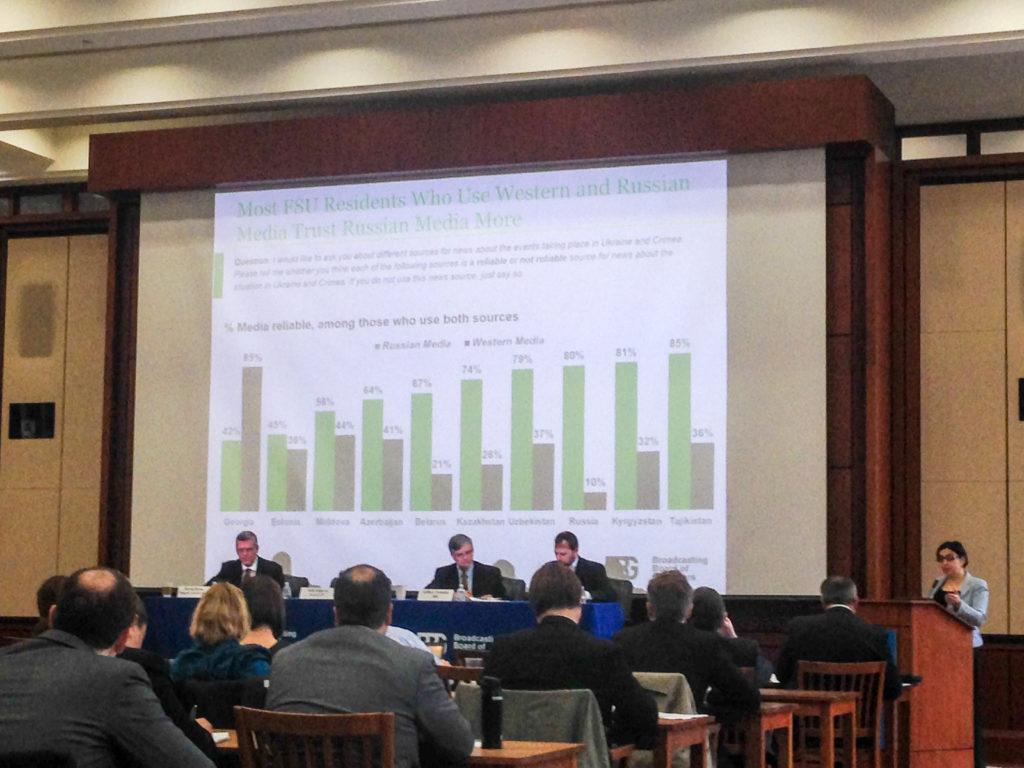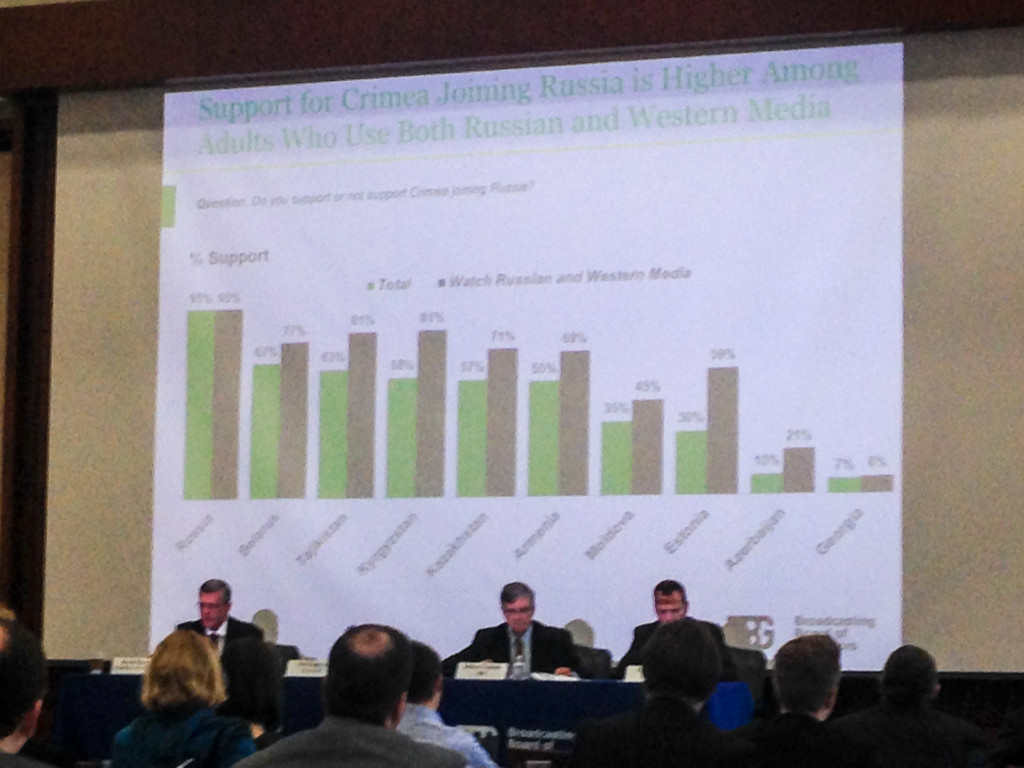BBG Watch Commentary

With IBB Deputy Director Jeff Trimble, Broadcasting Board of Governors’ longtime executive providing strategic editorial guidance, sitting under a large slide showing that “Most Residents of the former Soviet Union Who Use Western and Russian Media Trust Russian Media More,” Gallup, the international polling and management consulting organization, told a Washington audience Thursday that Russia is winning information war in former Soviet states, with Voice of America (VOA) and Radio Free Europe / Radio Liberty (RFE/RL) failing to effectively counter Russian propaganda.
Another Gallup and Broadcasting Board of Governors slide at the conference, “Assessing Russia’s Influence in Its Periphery: Is Russia Really Winning an Information War?,” showed that Russia is not only winning the information war, but that programs produced by BBG media entities may actually have a negative impact for the United States.

Whether such Gallup polls, conducted in countries or territories such as Crimea where individuals may be afraid to provide true answers to unknown pollsters, can be viewed as reliable is a question that has been raised by some experts not only in the U.S., but also in Ukraine and in Russia.
In 2014, BBG officials — U.S. government executives of the BBG’s International Broadcasting Bureau who control millions of U.S. taxpayers’ dollars — rushed to conduct a “public opinion poll” in Crimea merely a few weeks after it was occupied and annexed by Russia without asking the Ukrainian government for permission and most likely without clearing it with the U.S. State Department. Afterwards, BBG/IBB executives did not cast any doubts on the validity of their Crimea poll and did not point out in their June 3, 2014 press release that the United States Government considers the annexation of Crimea by Russia to be illegal and to be against international peace, strategic stability and U.S. interests. They did not say that this was the first annexation by force of a territory of a sovereign European state since the end of World War II. VOA reported at that time that “‘It [Crimea ]is part of Russia now, and you saw that the support is huge for Russian government’, said [Gallup pollster] Esipova.” Neither BBG officials nor VOA in its June 2014 report noted that significant minorities in Crimea, including the Crimean Tatars and ethnic Ukrainians, may have been living in fear of Russia as the occupying power and perhaps unlikely to share honestly their their views with complete strangers. Neither BBG officials nor VOA mentioned the Crimean Tatars who constitute about 12 percent of Crimea’s population.
SEE: 75th Anniversary of Sumner Welles Declaration – U.S. Public Diplomacy from Success to Failure at BBG, BBG Watch, July 16, 2015.
###
VOICE OF AMERICA
News / USA
Pollster: Russia Winning ‘Information War’ in Former Soviet States
Photo Not Reposted
FILE – Colonel Sergei Storozhenko, commander of the military unit in the village of Perevalnoye, Crimea, talks to the media outside Simferopol, March 6, 2014, the day that Crimea’s parliament voted to join Russia.
Jonas Bernstein
February 04, 2016 8:19 PM
Moscow’s annexation of Crimea from Ukraine in 2014, and its subsequent support for armed separatists in the eastern part of the country, has been accompanied by a major Russian information campaign in support of those actions.
That campaign has targeted not only Russia’s domestic audience but also audiences in neighboring states that receive Russian media and, because of having once been part of the Soviet Union, are home to a significant number of Russian-language speakers.
A group of experts held a conference Thursday in Washington to assess whether Russia is winning the battle for influence in neighboring countries. One of those experts, from a leading polling organization, stated unequivocally that it is.
The conference, “Assessing Russia’s Influence in Its Periphery: Is Russia Really Winning an Information War?” was organized by the Broadcasting Board of Governors, the independent U.S. government agency that oversees all government-supported U.S. civilian international media, including Voice of America and Radio Free Europe/Radio Liberty; and by Gallup, the international polling and management consulting organization.
Presentations at the conference were based on what the organizers described as “the latest media consumption and attitudinal findings from Estonia, Latvia, Lithuania and Moldova,” along with Gallup 2014 World Poll data from 12 countries that once were part of the Soviet Union.
The 2014 Gallup World Poll found that “a vast majority” of people in 12 countries that were part of the Soviet Union were following the news about the situation in Ukraine and Crimea very closely during the conflict in 2014, with more people considering Russian media as a more reliable source than Western media. Majorities of the respondents in Russia, Kyrgyzstan, Kazakhstan, Tajikistan, Belarus, Armenia and Uzbekistan deemed Russian media “reliable” for news about the situation in Ukraine and Crimea.
Warning to West
Gallup found that majorities in most of the former Soviet states supported Crimea becoming part of Russia, and that respondents who used Western media in addition to Russian media were even more likely to support Crimea becoming part of Russia than those who only used Russian media.
Neli Esipova, Gallup’s director of research for global migration and the Gallup World Poll’s regional director for 29 Eastern European and former Soviet countries, said at Thursday’s conference that those 2014 Gallup World Poll respondents in the 12 former Soviet states who lived in urban areas and were better educated tended to be more supportive of Russia’s policy in regard to Crimea.
“If the West wants to participate in forming the opinion of people in this region, it will clearly need to makes some changes in its communications strategy,” Esipova said. “And those changes have to be made not only in the content, but in the tone of how people present information, how the West presents information. The uniqueness of this region is that people in this region have very strong ties to Russia, and the Russian media knows its audience, and knows how to appeal to it.”
Esipova concluded: “In this round of the information war, the Russian media have won.”
Another conference participant, Jeffrey Trimble, deputy director of the BBG’s International Broadcasting Bureau, said the West must formulate a response to the enhanced media capabilities of both authoritarian states and terrorist organizations.
“The 21st century is seeing a new intensity and scale of media manipulation, psychological warfare and disinformation,” he said. “The increasingly sophisticated use of media by authoritarian regimes, the advances in information war by Russia, China, ISIS, are throwing up new challenges, from technical questions about the power of social media through to deeply philosophical issues about the nature of truth and reality.”

Comments are closed.